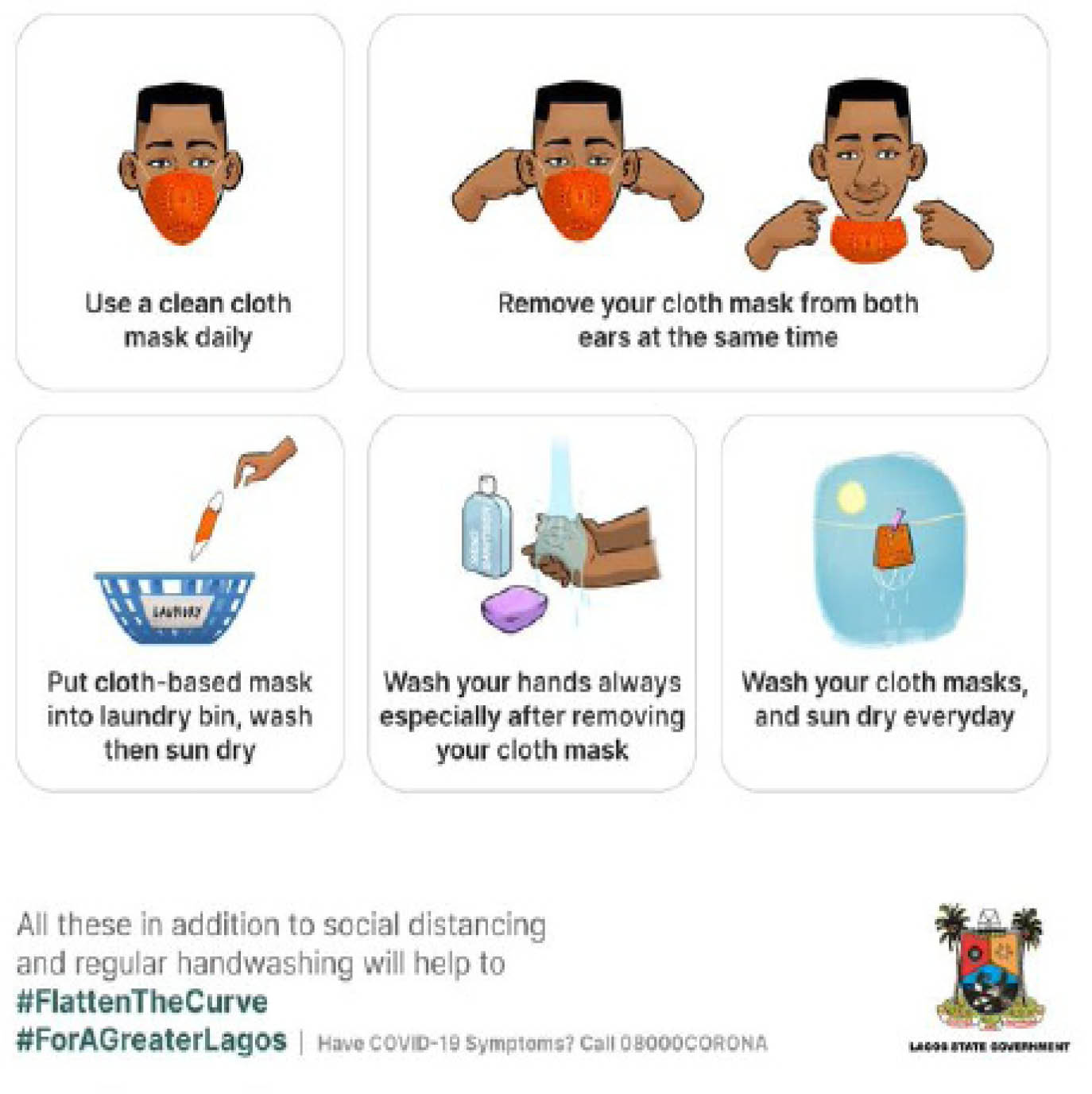Many states including Lagos as well as the Federal Capital Territory are advocating for the compulsory use of face mask to curb the spread of COVID-19 in the country.
As such, there is a massive demand for surgical facemask and the N95, hence the introduction of cloth facemask by the state governments.
- What Nigerians must do to avoid COVID-19 spread as economy re-opens
- Nigerian tailors are hand-making PPE to help fight coronavirus
Lagos government said it plans to sew three million pieces of face mask for the 20 million residents in the state.
However, since the advocacy for cloth masks, there have been various types of masks sewn by all types of seamstresses.
Our correspondent had a chat with an epidemiologist at the University of Ilorin Teaching Hospital, Prof Tanimola Akande, who explained what every Nigerian must know about face mask, irrespective of whether it is surgical, cloth or N95.
Right mask
Prof Akande explained that the facemask with the best quality is the N95 and that it should be used by only health workers, especially those who are likely to treat COVID-19 cases, then the surgical mask which should also be reserved for health workers, especially with the scarcity globally.
He, however, added that there is no harm in improvising with cloth masks.
He insisted that any cloth used for a mask should be the right quality and not too porous so that droplets cannot escape from it.
He added that the level of tightness to the face is important. Despite covering the nose and mouth and some parts of the face, if the mask is free and air can still get in, then it is as good as not covering, the professor said.
He noted that every individual must have more than a mask so that when one is washed, another can be used.
Material for cloth mask
The public health expert said cloth mask, irrespective of the material, should not be too thick that someone will end up suffocating and not too light (porous) to allow droplets in or out.
Ankara can be used if thick, but if not, it can be doubled.
Some people put some filter in-between it but it is important not to allow droplets in or out.
“Asides Ankara, polyester, aso-oke or other materials can also be used but the danger is, do not suffocate yourself because the material will bring about heat to your mouth.
“Putting foam in the face mask is not ideal because foam in itself is too thick and it can make someone to get suffocated. But, napkin can be put in-between, that will reduce the porosity and that should also not be too thick to enable the user breath well,” he stated.
Test needed
Prof Akande insisted a test must be performed before using a mask.
He said to test the porosity of a mask, “”blow through it and try to extinguish a fire, if the fire is blown off easily, it is not a good face mask but if someone attempts to blow off the fire and it doesn’t blow off, it is a good one.”
Care of the mask
According to the expert, after buying or making the mask, ensure it is washed since no one has an idea whether a COVID-19 carrier has touched the material or the mask before it was sold, adding that it could have been touched by an asymptomatic person who would have infected it unknowingly.
“Wash, iron and reuse. If an individual thinks he or she is exposed and the virus is already on the mask, then wash thoroughly with detergent to get rid of the virus.
“Spreading in the sun to dry is also helpful.
“Due to the epileptic power supply in the country, it does not necessarily mean it needs to be ironed and it is not necessary to put all kinds of disinfectant while washing, rather, only wash with soap and water and iron it.”
This, however, is not the view of Dr Biodun Ogungbo, a neurosurgeon in Abuja, who said, “To wash a cloth mask, take them off carefully and drop in a washbowl.
“Use soap, hot water and perhaps some disinfectant like Dettol, JIK or HYPO to soak them for a while. This should kill the virus and make the mask safe to wear again.”
Prof Akande further said the N95 mask can be reused depending on the level of exposure.
He said if someone is exposed to a real COVID-19 patient, ideally, the health worker wearing the mask should not reuse, but that in places where it is scarce, even in Europe, they reuse by applying some aerosols or fumigating them.
But, if someone is with a COVID-19 patient, the mask should not be used for too long because it can expose someone.
Removing the mask
The Unilorin-based Prof Akande said the mask should not be removed in such a way that it will soil and contaminate the hands with the virus.
Facemask, irrespective of what it is made of, should be removed from the ears so it won’t infect the hands.
He warned the cloth mask users to avoid touching the part that covers the face and also avoid putting on the chin or forehead for a while before putting it back.
The reason, according to him, is that there are chances that there will be droplets on the mask and when the hands touch the droplets while removing it, it will eventually infect the hands.
To get rid of droplets in the hands after removing the mask, Dr Ogungbo advise Nigerians to either dispose the N95 or surgical mask in the bin or wash the cloth facemasks immediately after use, then wash the hands with soap for at least 20 to 40 seconds before touching the face.
How long to use a mask
According to Prof Akande, ideally, depending on the kind of exposure that one has, mask should only be used for some hours in some circumstances or remove it and then change to another one.
Most importantly
Prof Akande insists that it is important for everyone to wear the mask.
According to him, when someone who is not infected uses a mask and a COVID-19 carrier without mask coughs into that person, the exposure has been reduced to about 10 percent.
But, if both the carrier and non-carrier are using the mask, the exposure has been reduced by 90 percent.
Whoever is going out should use a mask as there will be no way of knowing who is infected or not, Akande told our correspondent.

 Join Daily Trust WhatsApp Community For Quick Access To News and Happenings Around You.
Join Daily Trust WhatsApp Community For Quick Access To News and Happenings Around You.


